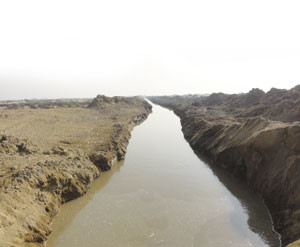In Pakistan, Everyday Needs Are Ignored in the War on Terror
 Terrorism is a global phenomenon. It is a plague that has inspired panic around the world. Thus, superpowers such as the US feel that it is imperative to curb the problem as fast as they can. Meanwhile Pakistan has, in recent years, become a synonym for “terrorist central.” It is no surprise then that most of the aid and assistance that flows into the country from foreign powers is directed towards curbing the growth of terrorist forces.
Terrorism is a global phenomenon. It is a plague that has inspired panic around the world. Thus, superpowers such as the US feel that it is imperative to curb the problem as fast as they can. Meanwhile Pakistan has, in recent years, become a synonym for “terrorist central.” It is no surprise then that most of the aid and assistance that flows into the country from foreign powers is directed towards curbing the growth of terrorist forces.
Concentrating resources primarily on combating terrorism, however, comes with a great opportunity cost: helping the Pakistani people, whose lives are mired with problems ranging from malnutrition and illiteracy to power outages and inflation. And thinkers in the West are now awakening to this fact as well. Michael Kugelman of the Woodrow Wilson International Center for Scholars writes eloquently in the Huffington Post about facts that serve as a reminder of what we ignore when countering radicalism becomes our consuming obsession. Sixty million people are undernourished in this country, over 50% of Pakistan’s 70 million children are not in school, some Pakistanis face power outages for as long as 20 hours every day and everybody has to deal with double-digit inflation that is approaching 14% in an environment where salaries do not keep pace.
It’s obvious that the citizens of this country are not happy. That’s not the surprise. What’s surprising is the fact that a writer finally decided to shed light on these issues that are just as pertinent, if not more so, for this country. People are dissatisfied, frustrated and resentful towards their government. Quite frankly, you can’t blame them. As of 2005, approximately 38.5 million people lacked access to safe drinking water, leading to a rise in waterborne diseases that claimed the lives of thousands. The sentiments that this inspires are fervent discontent and anger. And that’s just one of the several issues. Add a lack of food, adequate shelter and sanitation to the picture and you’ll start to see where all the bitterness comes from. These problems are not new to Pakistan. The fact that they have never been completely addressed or resolved makes these people feel as if they’ve been dismissed as an expendable collective.
This outlook is both tragic and very dangerous. Millions of lives are being scarred by issues that Pakistan has faced for decades, while successive governments have chosen to pay closer attention to everything from diplomacy (or a lack thereof) to the courts. Meanwhile, desperation erodes the trust people place in the government they elect. And that is the point where extremist organisations step in as the so-called ‘guardian angels’ of the people who have been left with nothing. By promising (and sometimes providing) what the government does not give its people, these organisations can bring about a shift in ideology. So not only does the state lose support but also it unintentionally transfers it to organisations that challenge its very existence. It is high time that analysts and policymakers alike realise that ignoring the needs of the people to combat terrorism will not help. It will only exacerbate the issue they meant to stop in the first place.



